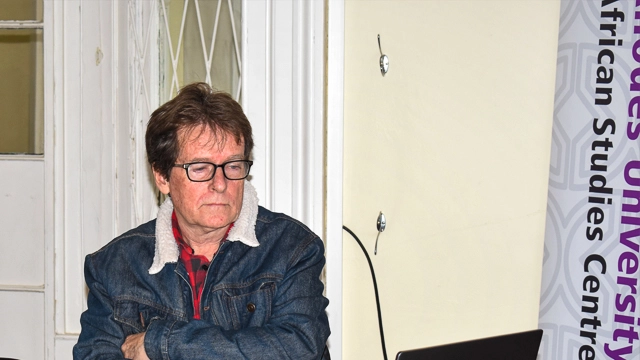
By Zindzi Nkunzi
On 27 September 2022, Rhodes African Studies Centre (RASC) hosted a book launch in the Humanities seminar room and online. One of the editors, Professor Kirk Helliker was present at the Centre, and the other editors and contributors of the book joined online. He also chaired the launch on behalf of the Dean of Humanities and Head of the RASC, Professor Enocent Msindo.
Professor Helliker extended a warm welcome to all in-person and online attendees. "I would like to thank Professor Msindo for allowing me to have this launch under the Centre," he mentioned. Three of Professor Msindo’s former Masters and PhD students contributed chapters to the book.
The Unit of Zimbabwean Studies at Rhodes University, led by Professor Kirk Helliker, released a new book titled Livelihoods of Ethnic Minorities in Rural Zimbabwe. The book is edited by Helliker, as well as Sociologist, Chairperson and Lecturer at the Department of Community Studies at Midlands State University, Dr Patience Chadambuka, and PhD candidate in Anthropology at La Trobe University, Australia, Joshua Matanzima. Matanzima graduated with a Master of Arts degree from Rhodes University a few years ago.
The book consists of twelve chapters that examine different ethnicities within three sections: Land, Livelihoods and Ethnicity; Wildlife, Livelihoods and Ethnicity; and Crisis, Livelihoods and Ethnicity.
The ethnic groups covered in the book include Chewa, Tonga, Tshwa San, Shangaan, Basotho, Ndau and Hlengwe. While many ethnic groups exist in Zimbabwe, Shona and Ndebele are the dominant ones. The rest are viewed as minorities.
In the book, 'minority' speaks not only to the demographic size but other attributes that have led to the marginalisation of these ethnic minorities.
These include the popular and political constructs reinforced since the colonial era through missionary ethno-cartography and by the nationalist state. In introducing the book, Professor Helliker stated, "The history of Zimbabwe has shown that a lot of smaller ethnic groups have been marginalised, subordinated, sometimes assimilated into these larger ethnic groups, excluded in certain ways in Zimbabwe."
"Ethnic minorities [in Zimbabwe] is not a term that we use to refer to those who are demographically small in size. We are focusing on the power dimensions of some ethnic groups. We are looking at those who some have referred to as the 'forgotten people' of Zimbabwe," Dr Chadambuka added.
The book examines the lives and livelihoods of ethnic minorities and the significance of ethnicity for livelihoods in Zimbabwe by focusing on the intertwined processes of ethnic belonging and livelihood construction. It provides in-depth research on the livelihoods of the marginalised ethnic minorities in both colonial and postcolonial Zimbabwe.
Dr Chadambuka discussed the critical and crucial themes in the book and provided input on the significance of the book.
In highlighting and discussing the relevant themes, she mentioned that "ethnicity on its own is very complex, fluid, situational and relational." She then briefly outlined the three themes and their focus.
The third book editor, Joshua Matanzima, spoke about the intended audience for the book. He started by quoting what was said by Professor Ian Scoones in his review of the book, "The book is an important resource to a wider audience including academics and policymakers," Matanzima said.
Concerning other intended audiences for the book, he stated, "The diverse content of the book will interest scholars who are working in other Social and Political Sciences, likely because ethnicity and livelihood covered in the book are entangled with typical issues such as landscape, political, economic crisis and wildlife, amongst other issues. The language used in the book is accessible."
Two authors that contributed to the book, Nicholas Nyachega and Codelia Govha Dhodho, shared their insights about the chapters they each have written. Nyachega mentioned that he wrote his chapter with his wife, Vongai Olivia Sagonda. The chapter is "Changing Livelihoods and Coping Strategies Among Ethnic Minorities and the Manyikas in the Honde Valley Borderlands Since the 1970s". He said, "The chapter tells a story about the experiences of what has been characterised by the locals, as ethnic minority groups."
Dhodho discussed her research on "Letting them starve: the 2008 Food Crisis and Marginalisation of the Tonga of Binga in Zimbabwe".
Professor Helliker closed off by thanking all attendees and, in particular, the editors and contributors of the book.
